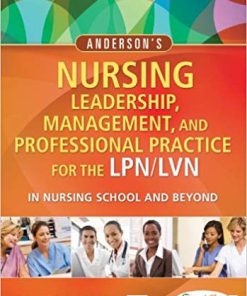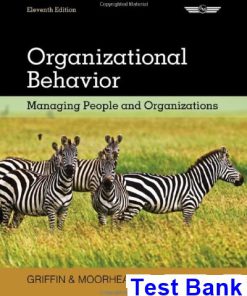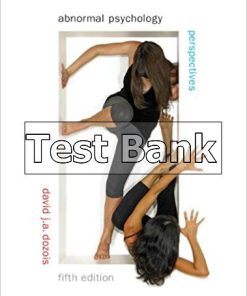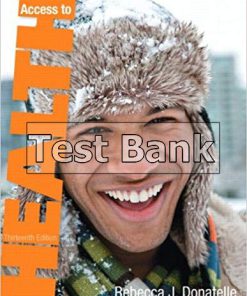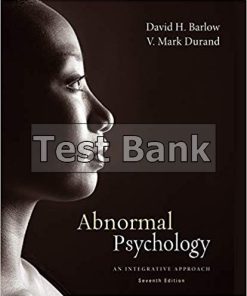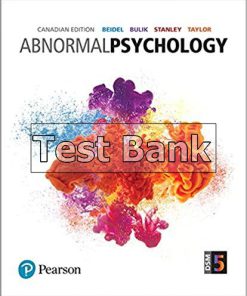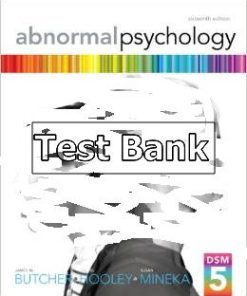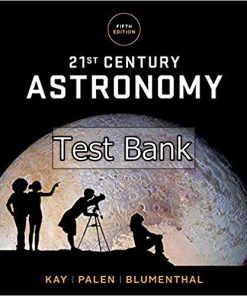Organizational Behavior in Education Leadership and School Reform 11th Edition Owens Test Bank
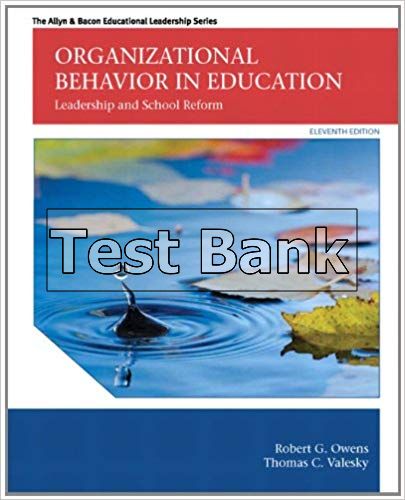
Product details:
- ISBN-10 : 0133489035
- ISBN-13 : 978-0133489033
- Author: Robert G. Owens
Organizational Behavior in Education, 11/e gives future and current educational administrators, superintendents, principals, and assistant principals an authoritative, well-established, timely look at organizational behavior and how leaders can create more effective school cultures. It offers the most up-to-date thinking and the most in-depth exploration of organizational leadership as it relates to decision making, organizational change, managing conflict and communications, and motivating self and others to achieve organizational goals. The authors challenge readers to develop and analyze the successful implementation of school reform, while helping them gain a professional understanding of the organizational theory and research that are the bedrock of modern practice. The new Eleventh Edition features updated research and developments in the field; an extensively revised, more systematic and logical presentation of organizational theory and its historical development; discussion of the new ELCC Standards and Elements that apply to program accreditation in Ed Leadership programs; APA format for all references and citations; new presentations of important research in the field; and more.
Table contents:
Organizational and Critical Theory. Schools as Educative Organizations
Organizational Theory
Theory Defined and Described
Two Major Perspectives on Educational Organizations
Critical Theory
Critical Race Theory
The Concept of Social Justice
The Relevance to School Leadership Today
Vision and Educational Leadership
Whose Vision Is It Anyway?
The No Child Left Behind Act
Research in Education
The Framingham Heart Study
-A Medical Example
The Tennessee STAR Study
-An Education Example
Research and NCLB
Voices From the Field: Rise Above the Mark: Public Education Reforms That Work
Assumptions, Beliefs, Behaviors
The Nature of Scientific Progress
Impact of Behavioral Science
Psychoanalytic Psychology
Sociological and Psychological Points of View
Cognitive Psychology
Social Psychology
Leadership as Coaching
Coaching as a Method of Teaching
Final Thoughts Contents note continued: Reflective Activities
Critical Incident: The Vision for South Shore High School
Suggested Reading
References
Guiding Concepts for a Theory of Practice. Two Principal Sources of Conflict
The “Great Debate”: Traditional Versus Progressive Education
The Beginnings of the Great Educational Debate
The Backlash of the 1950s
The Neoprogressives Emerge in the 1960s
The Contemporary Debate on Schooling
Three Critical Books
A Paradigm Shift in Education
A Passion for Equality
The Traditional Paradigm of Intelligence
A New Paradigm of Intelligence
-or the Lake Wobegon Syndrome?
Multiple Intelligences Theory
Gardner’s Multiple Intelligences Theory (MIT)
Perkins’s Learnable Intelligence Theory
Smart Schools
Emotional Intelligence
The Debate Continues
Theory of Action
Theory of Practice
Voices From the Field: How One Principal Implements Her Theory of Practice Contents note continued: The Game Plan: A Coaching Metaphor
Final Thoughts
Reflective Activities
Critical Incident: Controversy at the Principals’ Meeting
Suggested Reading
References
Mainstreams of Organizational Thought. Organizational Behavior
Two Concepts of Organization and Behavior
Why Study Organizational Behavior?
Impact of the Industrial Revolution
Frederick W. Taylor and Scientific Management
The Beginning of Modern Organizational Theory
Emergence of Bureaucratic Organizational Theory
The Rise of Classical Organizational Theory
Scientific Management Versus Classical Organizational Theory
Organizational Concepts of Classical Theory
Classical and Neoclassical Administrative Concepts
The Ideas of Mary Parker Follett
The Human Relations Movement
The Western Electric Studies
Sociometry
Behavior Patterns in Groups
Leadership as a Group Function
The Paradox of Organizational Structure Contents note continued: The Organizational Theory Movement
Human Relations and Organizational Behavior
Final Thoughts
Reflective Activities
Critical Incident: A Philosophical Disagreement on Administration
Suggested Reading
References
A Systems Approach to Organization. Organizational Structure and People
General Systems Theory
Social Systems Theory
Role Conflict
Role Ambiguity
Functional Roles in the Group
Role Related to Social Systems Theory
Equilibrium
Homeostasis
Feedback
Sociotechnical Systems Theory
Voices From the Field: A Systems Approach to District Budget Development
Contingency Theory
Rational Planning Models
Open System Related to Contingency Theory
Technological Change in the Suprasystem
Interaction with the External Environment
Contingency Theory and Organizational Behavior in Schools
Final Thoughts
Reflective Activities
Critical Incident: A Tale of Two Principals Contents note continued: Suggested Reading
References
Motivation: Understanding Self and Others. The Meaning and Patterns of Motivation
First Pattern: Direction in Making Choices
Second Pattern: Persistence
Third Pattern: Intensity
The Extrinsic-Intrinsic Debate
Extrinsic, or Behaviorist, Views
Intrinsic Views of Motivation
Individual and Group Motivation
The Western Electric Studies Revisited
Individual Differences
In Praise of Diversity
Voices From the Field: Critical Race Theory: Being Prepared to Pay the Price
Archetypes
Human Intelligence
Temperament and Organizational Behavior
The Four Psychological Types
The Myers-Briggs Type Indicator (MBTI)
An Educational Application
-True Colors®
Final Thoughts on Temperament and Organizational Behavior
Intrinsic Motivation
Cognitive Views of Motivation
The Humanistic Perspective
Final Thoughts
Reflective Activities Contents note continued: Critical Incident: Changes at Washington High School
Suggested Reading
References
The Human Dimension of Organization. Reconceptualizing the Nature of Organizations to Focus on People
A New Paradigm of Organizational Theory
A Focus on People: The Rise of Qualitative Research Methods
Educational Organizations as Loosely Coupled Systems
Educational Organizations as Dual Systems
Building Human Capital
Human Resources as Assets
The Dark Side of Leadership
Human Resources Development
Developing Human Capital Through Positive Organizational Culture
Five Basic Assumptions of Effective Schools
Voices From the Field: Curriculum and Professional Development
Professional Development
Final Thoughts
Reflective Activities
Critical Incident: Turning Madison High Around
Suggested Reading
References Contents note continued: Organizational Culture and Organizational Climate. Defining and Describing Organizational Culture and Climate
The Importance of Organizational Culture
Organizational Culture and Organizational Climate Compared and Contrasted
Organizational Culture
Levels of Culture
How Organizational Culture Is Created
How Organizational Climate Is Created
Describing and Assessing Organizational Culture in Schools
Relationship Between Organizational Culture and Organizational Effectiveness
Voices From the Field: Changing the Culture, Making the Grade: Going From an F to Almost a B
Four Management Systems
Final Thoughts
Reflective Activities
Critical Incident: Two Schools
-Two Different Cultures
Suggested Reading
References
Organizational Change. Historical Context for Change
Historical Impact on Today’s Change Efforts
School Reform and Change
Power Relationships and School Restructuring
Aims of Educational Reform Contents note continued: The Tradition of Change in American Education
Natural Diffusion Processes
Planned, Managed Diffusion
Three Strategies of Planned Change
Empirical-Rational Strategies of Change
Power-Coercive Strategies of Change
Normative-Reeducative or Organizational Self-Renewal Strategies
Voices From the Field: Changing the Mission and Culture to Become a School of Choice
The Effectiveness of Organizational Development
Two Emerging Questions
Can the Schools Do It Alone?
Is School Reform Enough?
Final Thoughts
Reflective Activities
Critical Incident: The Man for the Job!
Suggested Reading
References
Leadership. Adaptive Leadership
Leadership and Management
Power and Leadership
Leadership Different From Command
Power Defined
Two-Factor Leadership Theory Abandoned
Leadership as a Relationship with Followers
Your Understanding of Human Nature Is Critical
Transformational Leadership Contents note continued: Transformational Leadership Compared and Contrasted with Transactional Leadership
Moral Leadership
A Progression
A Process of Growth and Development Through Instructional Leadership
Implementing Transformational and Moral Leadership
Distributed Leadership
Professional Learning Communities
Parent Involvement
Voices From the Field: Utilizing Effective School Research Through Professional Learning Communities
Sustainable Leadership
Research on Sustainable Leader Behavior
Final Thoughts
Reflective Activities
Critical Incident: Leadership at North River Middle School
Suggested Reading
References
Decision Making. Individual Versus Organizational Decision Making
Rationality in Decision Making
Rational Decision-Making Models
Limits on Rationality in Decision Making
The Gap Between Theory and Practice
Vroom and Yetton’s Five Leadership Styles
Seven Situation Issues Contents note continued: Decision-Process Flowchart
The Nature of Managerial and Administrative Work
How Administrators Think
The Influence of Organizational Culture on Decision Making
Closing the Gap Between Theory and Practice
Theory of Practice
Human Resources Development
-A Theory of Decision Making
Participative Decision Making
Participative Decision Making and Empowerment
Participative or Democratic?
An Explicit Decision-Making Process
Who Identifies the Problem?
Emergent and Discrete Problems
Who Should Participate?
Desire of Individuals to Participate
Participation Requires High Level of Skills
Voices From the Field: Collaborative Decision Making
Paradigms for Collaborative Decision Making
School-Based Decision Making and the Total Teamwork System
Data-Based Decision Making and Total Quality Management
Final Thoughts
Reflective Activities
Critical Incident: Deciding How to Decide
Suggested Reading Contents note continued: References
Conflict and Communications in Organizations. The Nature of Conflict in Organizations
Conflict Different From Attacks
Contemporary Views of Conflict
Effects of Organizational Conflict
The Criterion: Organizational Performance
The Dynamics of Organizational Conflict
Hostility
A Contingency View
A Process View of Conflict
A Structural View of Conflict
An Open-Systems View of Conflict
Approaches to Organizational Conflict
The Win-Lose Orientation to Conflict
A Contingency Approach to Conflict
Diagnosing Conflict
Dealing with Conflict
Dealing with Difficult Individuals
Dealing with Stress From Conflict
Final Thoughts
Reflective Activities
Critical Incident: Conflict in the First-Grade Team
Suggested Reading
References
School Reform. Market-Based School Reform
Origin of Market-Based Reforms
Economic Theory and School Reform Contents note continued: School Reform as Investment Opportunity
Current Status of Charter Schools
Vouchers
Successes of Market-Based Reforms
Privatization and Virtual Education in Higher Education
Standards-Based School Reform
Common Core State Standards
Assessing the Common Core State Standards (CCSS)
The Condition of Education
The Achievement Gap
PISA and TIMSS
Summary Findings of EPI Study
Whole-School Reform
Increasing School Autonomy
Support for School Leaders
Research Support for CSR Models
Response to Intervention (RTI)
Voices From the Field: RTI Interventions in a Small Rural High School
Teacher Education and School Reform
Accreditation of Teacher Education Programs
Federal Focus on Colleges of Education
A Broader, Bolder Approach to Education
Final Thoughts
Reflective Activities
Critical Incident: District Test Scores Decline Once Again
Suggested Reading
References
People also search:
organizational behavior in education leadership and school reform 11th edition
organizational behavior in education leadership and school reform (11th ed.)
organizational behavior in education 11th edition pdf
organizational behavior and management 11th edition pdf
organizational behavior activities
Instant download after Payment is complete





